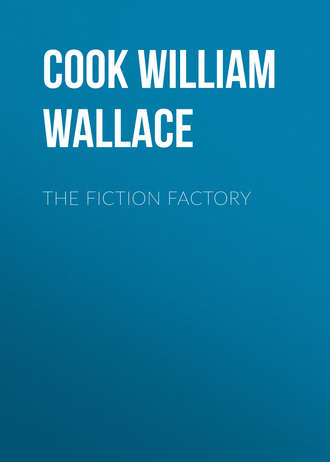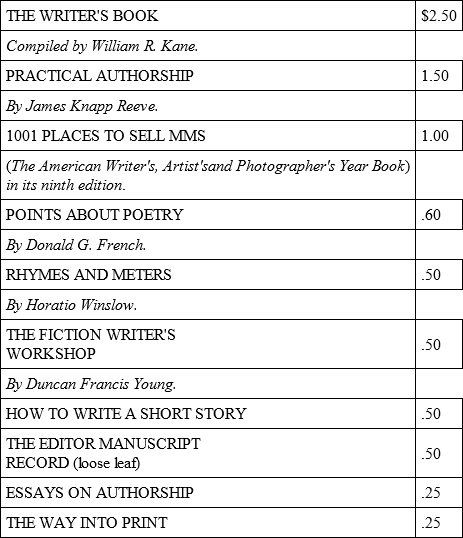 полная версия
полная версияThe Fiction Factory
PATRONS AND
PROFITS FOR
TWENTY-TWO YEARS
On the 20th of this month (September, 1911) it will be just twenty-two years since Edwards received payment for his first story. On Sept. 20, 1889, The Detroit Free Press sent him a check for $8. On that $8 the Fiction Factory was started.
Who have been the patrons of the Factory for these twenty-two years, and what have been the returns?
A vast amount of work has been necessary in order to formulate exact answers to these questions. Papers and other memoranda bearing upon the subject were widely scattered. During Edwards' travels about the country many letters and records were lost. The list that follows, therefore, is incomplete, but exact as far as it goes. More work was realized upon, by several thousands of dollars, than is here shown. For every item in the record Edwards has a letter, or a printed slip that accompanied the check, as his authority. The errors are merely those of omission.
Titles of the material sold will not be given, but following the name of the publication that purchased the material will be found the year in which it was either published or paid for.

The finest music in the room is that which streams out to the ear of the spirit in many an exquisite strain from the hanging shelf of books on the opposite wall. Every volume there is an instrument which some melodist of the mind created and set vibrating with music, as a flower shakes out its perfume or a star shakes out its light. Only listen, and they soothe all care, as though the silken-soft leaves of poppies had been made vocal and poured into the ear. —James Lane Allen.
When William Dean Howells occupied an editorial chair in Harper's office, a young man of humble and rough exterior one day submitted personally to him a poem. Mr. Howells asked:
"Did you write this poem yourself?"
"Yes, sir. Do you like it?" the youth asked.
"I think it is magnificent," said Mr. Howells. "Did you compose it unaided?"
"I certainly did," said the young man firmly. "I wrote every line of it out of my head."
Mr. Howells rose and said:
"Then, Lord Byron, I am very glad to meet you. I was under the impression that you died a good many years ago."
ADVERTISEMENTS
AnnouncementIn addition to "The Fiction Factory," The Editor Company are publishers at Ridgewood, New Jersey, of The Editor, (The Journal of Information for Literary Workers), which has been published solely in the interests of writers for eighteen years, and of the following books:

THE EDITOR
If you write, or if you have an itching to write, we want to talk to you.
The Editor, we may explain, is "The Journal Of Information For Literary Workers." It is not at all pretentious, and not at all dull. It is a matter-of-fact little magazine, always filled with good, readable articles on the technique of writing. Sometimes they are contributed by authors and sometimes by editors.
We aim to show our patrons, so far as such things may be taught, how to write fiction, poetry, articles and the like, and then how to sell them, provided they are up to the standard demanded by editors. We have been assured so many times that it wearies us, that our magazine has been the lever that pried open the editorial doors of pretty nearly every publication in the country. In addition to our articles we present our Literary Market department in which we list monthly the complete report of editorial needs, announcements, policies, changes, prize-contests, etc. This enables the writer to keep his finger on the magazine pulse; he knows what to write, when to write it, how to write it, when to submit it, what payment will be made, and countless other points. Authors such as George Allan England, who is selling regularly to McClure's, Red Book, Bohemian, etc., have been good enough to say that this department alone is worth the subscription price. Now add to the foregoing a spice of good verse, bright editorial comment, and you'll know why every editor and very nearly every author of note sends his writer-friends to us.
Why you can't write and do without the authors' trade-journal! You will always find something between the covers of the magazine that drives you to work, that spurs you to greater efforts, that puts you on the high road to success.
We pride ourselves on the fact that The Editor is a good, live text-book. It is a pretty sort of a teacher, you know, who never sees an educational journal; new methods and systems are cropping out constantly. And no writer – we leave this to you – likes to send a manuscript to a magazine that suspended a few months ago; nor allow an article to go unread that may cover just the point on which his or her rejections cling. The writer wants hints, helps, and as many of them as possible; everybody does. There is no magazine that better meets this want than The Editor.
We've succeeded in pleasing and making famous the promising writer-folk of this country since 1894. Mayn't we have you?
1
"Leave-off" – the place where a serial is broken, and the words "To be continued in our next" appear. Mr. Matthew White, Jr., Editor of the Argosy, is supposed to have coined the expression. At any rate, Mr. White has a great deal to do with "leave-offs" and ought to know what to call them.
2
In these later times, with other hands than those of Mr. Tozer at the helm, The Chicago Ledger seems to have become the Sargasso Sea of the popular fictionist – a final refuge for story derelicts. The craft that grows leaky and water-logged through much straining and wearisome beating about from port to port, has often and often come to anchor in the columns of the Ledger.
3
Mr. Harriman is now with The Ladies' Home Journal.
4
"Dan Quixote," for instance published in The All-Story Magazine, and republished as "The Brass Bowl."
5
This magazine, by the way, which had an humble beginning, has grown into one of the high class "populars" and has a wide circulation.
6
Telegram sent on same day letter was received saying story was satisfactory.
7
What do you think of that!
8
"There and Back" went through the Fiction Factory in twelve days.
9
This story sold through Kellogg Newspaper Company, Chicago. The two short stories sold to the late lamented Wayside Tales, Detroit, Mich.
10
A mistake, the story appeared in The Blue Book.
11
Edwards uses a fictitious name for this correspondent.
12
Now no more as The Cavalier, the former monthly, now a weekly has "absorbed" The Scrap Book.
13
Mr. Rathborne has recently given up his editorial duties and has retired to what seems to be the ultimate goal of writers and editors – a farm. He is somewhere in New Jersey.

